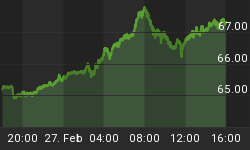At the end of the trading week a Bloomberg article appeared titled "BRIC IPOs Show Region's 'Growing Power,' Biggs Says," where famed investor and former Morgan Stanley chief global strategist Barton Biggs acknowledges that "clearly the BRICs are the big growth areas of the world."
Let's see how the recent excitement about US stock markets' move into positive territory stacks up against this year's performance of the BRIC countries:
Country | YTD |
US | 8.4% |
Brazil | 77% |
Russia | 60% |
India | 61% |
China | 85% |
| Source: Bloomberg | |
Not only are the BRICs on a tear, but the US dollars pain appears to be the BRIC markets' gain as illustrated in the graph below:

Courtesy: US Global Research
http://www.usfunds.com/docs/alert/alert_print.asp
The 10% fall in the dollar is even greater than this year's 8.4% gain in the S&P500. The lyrics of the pop song by the group Mims come to mind... "This is why I'm hot, and this is why you're not..." While US exporting multinationals should benefit from a declining dollar, their gains pale in comparison to the potential for the BRICs and other emerging markets (particularly the commodity-based countries) to continue their surge.
Some key questions investors looking to participate might consider:
- What portion of my portfolio should I allocate to the "BRICs"?
- Are the bulk of the BRIC equity gains behind them?
- Will lagging US performance eventually catch up?
- How does one invest in the "BRICs"?
As each individual investor's situation is unique, they should consult their financial advisor in answering all of those questions, but I will take a stab at some general guidance regarding the fourth point.
There are three primary ways to invest in BRIC country equity markets:
- Buy individual stocks (either through a country market exchange or an American Depository Receipt (ADR) in the US).
- Buy an Exchange Traded Fund (ETF) (either a series of country ETFs - Brazil, Russia, India, China - or one BRIC ETF such as EEB or BIK).
- Buy shares in a BRIC mutual fund (same as with ETFs -- either purchase 4 mutual funds representing each of the BRIC countries or one mutual fund with all of the BRICs).
For most people, my general preference is option 3, and just buying shares in one BRIC mutual fund. You should look for a solid manager with a strong track record. The BRICs are still emerging markets and are highly volatile. Many fund managers are quick to point out that these markets are highly vulnerable to 15-20% corrections. This makes their experience and expertise all the more valuable.
Moreover, the relative valuation of one BRIC nation versus another moves like a pinball and presents opportunities for the most skilled managers. For instance, India's market shot up as the result of their recent elections. India's stock market has experienced its biggest gains since 2003 and this potentially represents an "overshoot". India's market multiple of 16 still trails China's 19, but is more than double Russia's which stands at 7. Two recent articles in financial media publications extol the virtues of putting money to work in Russia. In the August 3 edition of Forbes Richard Morais authors a very well-written piece "The Russian Bear's Bull" -- the tagline is "Russia, the ugly stepsister of emerging economies, has plenty of promise for those who can stomach the wild ride." I was surprised to learn that Russia had the world's third largest foreign exchange reserves and that their total market capitalization of just under $500 billion was on par with Pakistan's and Jordan's.
In this weekend's edition of Barron's an interview with Arjun Divecha, manager of GMO Emerging Markets III Fund, ("The Four Cheapest Plays in Emerging Markets") reveals that he is currently "overweight" Brazil and Russia and underweight China and India. He lays out strong reasoning to make his case. The point is not that investor's should 'go long' Brazil and Russia and 'short' China and India. Rather, they should rely on the expertise of experience professionals. If you are learning this in the financial media, it is likely that fund managers are one or two steps ahead (and will remain so).
One last point: Because the opportunities for skilled fund managers to exploit these highly-fluid country valuations are rampant, their active management is likely to produce better results than a mostly fixed allocation which an ETF or close-end fund offers.
Bottom Line: Stick to the experts in trying to get the most bang for your BRIC.















